
Learn more about the future of policing by exploring the resources included here
The resources provided here are intended to assist practitioners, policymakers, community members and researchers find organizations, sites and materials with which they can further their interest in the things most likely to impact policing in the future. Older documents are offered here as they still have relevance today in advancing future policing.
In this section we also provide tools and links to resources with which the police, elected officials and community members can learn more about the rapidly growing field of artificial intelligence and its use by the police. While it has a wide breadth of resources, this site is not an exhaustive catalog of all that is known about the subject. But is certainly provides a starting point for such an exploration!
This section also provides resources for the police themselves to help implement AI in ways that advance rightful policing. We believe that the overwhelming majority of police leaders intend to use AI to help their organizations become more effective, empathetic and just. However, as is true for any technology for which we don’t have a deep understanding, the use of AI by the police can create unintended consequences and unintentionally harm the very people they are sworn to protect.
Future Policing Documents
-

American Policing in 2054
This 2024 USDOJ COPS Office document is a series of essays by policing experts on what policing will look like in 2054.
-
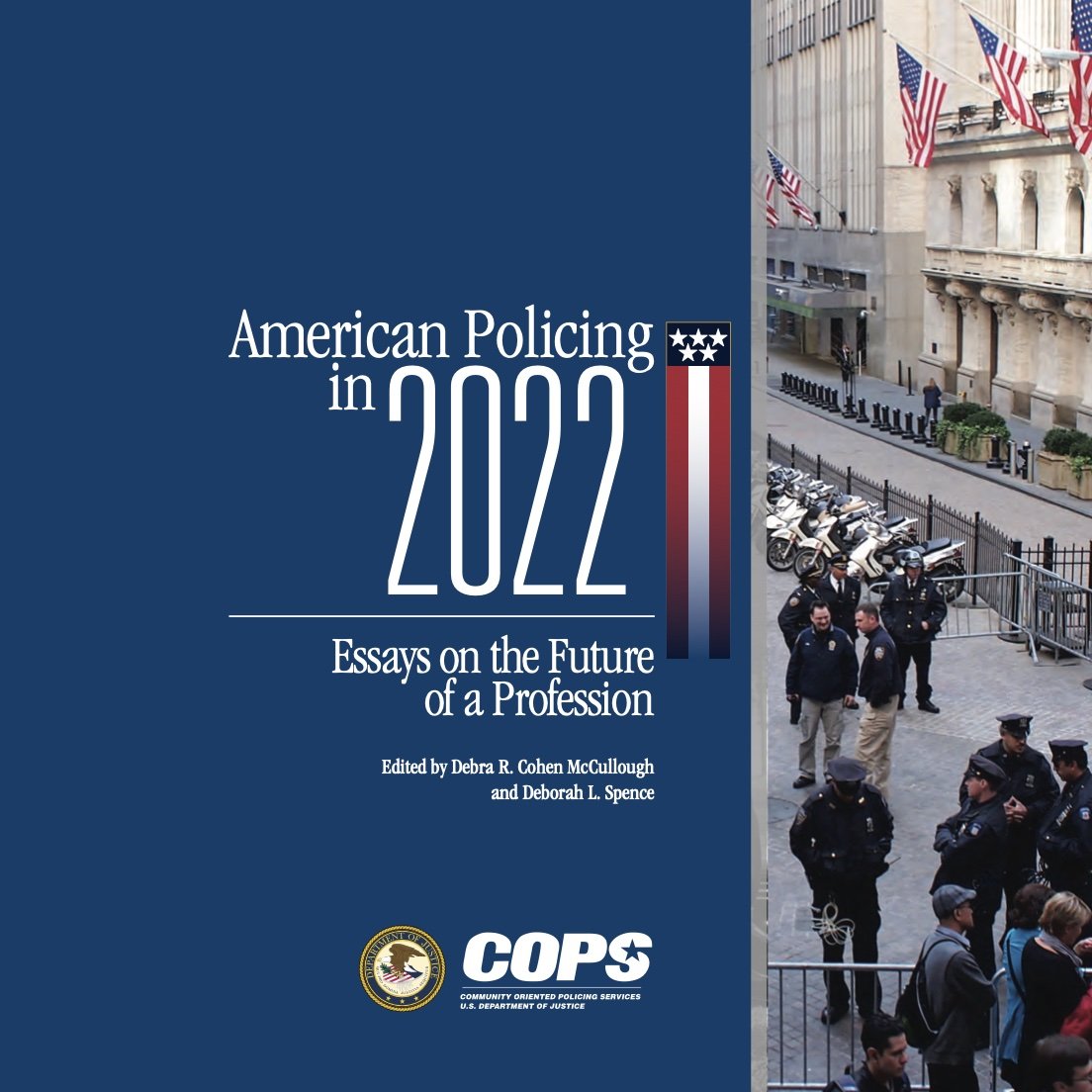
American Policing in 2022 - COPS Office
This 2012 USDOJ COPS Office document is a series of essays by policing experts on what policing will look like in 2022.
-

Task Force on 21st Century Policing
The final report by the President’s Task Force on 21st Century Policing.
-

Measuring What Matters
Unlike the private sector, police departments don’t go out of business. Their bottom lines are much different. This article discusses the challenge the police have in determining if what they’re doing matters and the difficulty in measuring that which is determined to actually matter.
-

Evidence Based Policing
Dr. Lawrence Sherman’s seminal article that introduces “evidence-based policing” to the world.
-

Being Smart on Crime with Evidence-based Policing
This is one practitioner’s perspective on the value of evidence-based policing practices and how they actually work in day-to-day policing.
-

Evidence Based Policing FAQ's
This document provides several pages of the most frequently asked questions about evidence based policing (EBP). It is intended to help police personnel, elected officials and community members gain a better understanding of what EBP is, what it isn’t, and the things they need to know to successfully implement it as an organizational philosophy.
-

Officer-per-thousand formulas & other policing Myths
“Officers per 1000” has long been the measuring stick for determining how many officers a community needs to protect it. This article debunks that and offers a much more rational approach to police staffing levels.
-
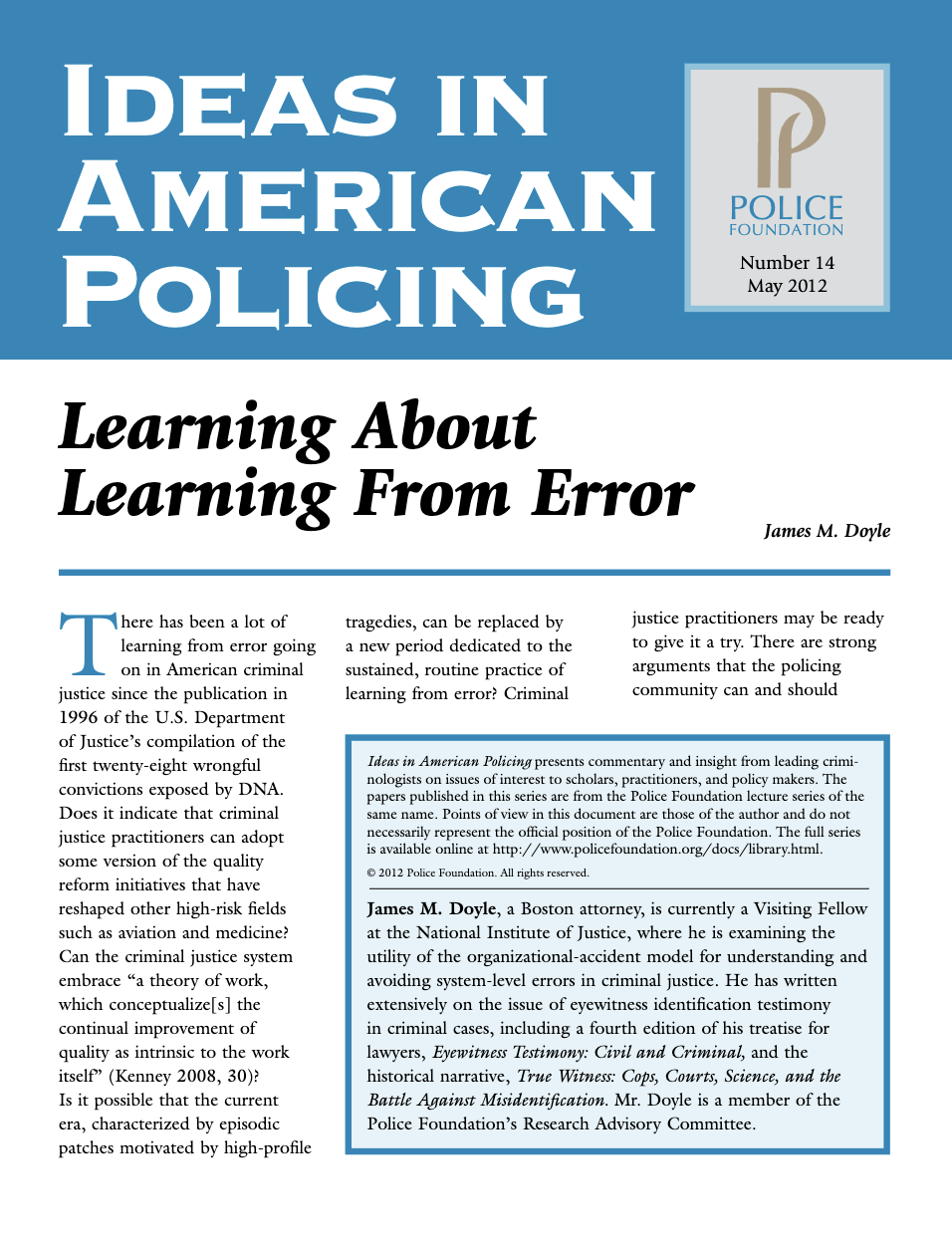
Learning about Error from Error
A seminal discussion about how we can learn to avoid error in the future by learning about error in the past.
-

Knowledge Management in Policing
This COPS Office publication discusses knowledge management (KM) in policing, examines one agency’s experience with KM and how it captured, used, shared, and increased what it knew about crime and disorder, and provides suggestions for adopting KM as an organizational strategy.
-
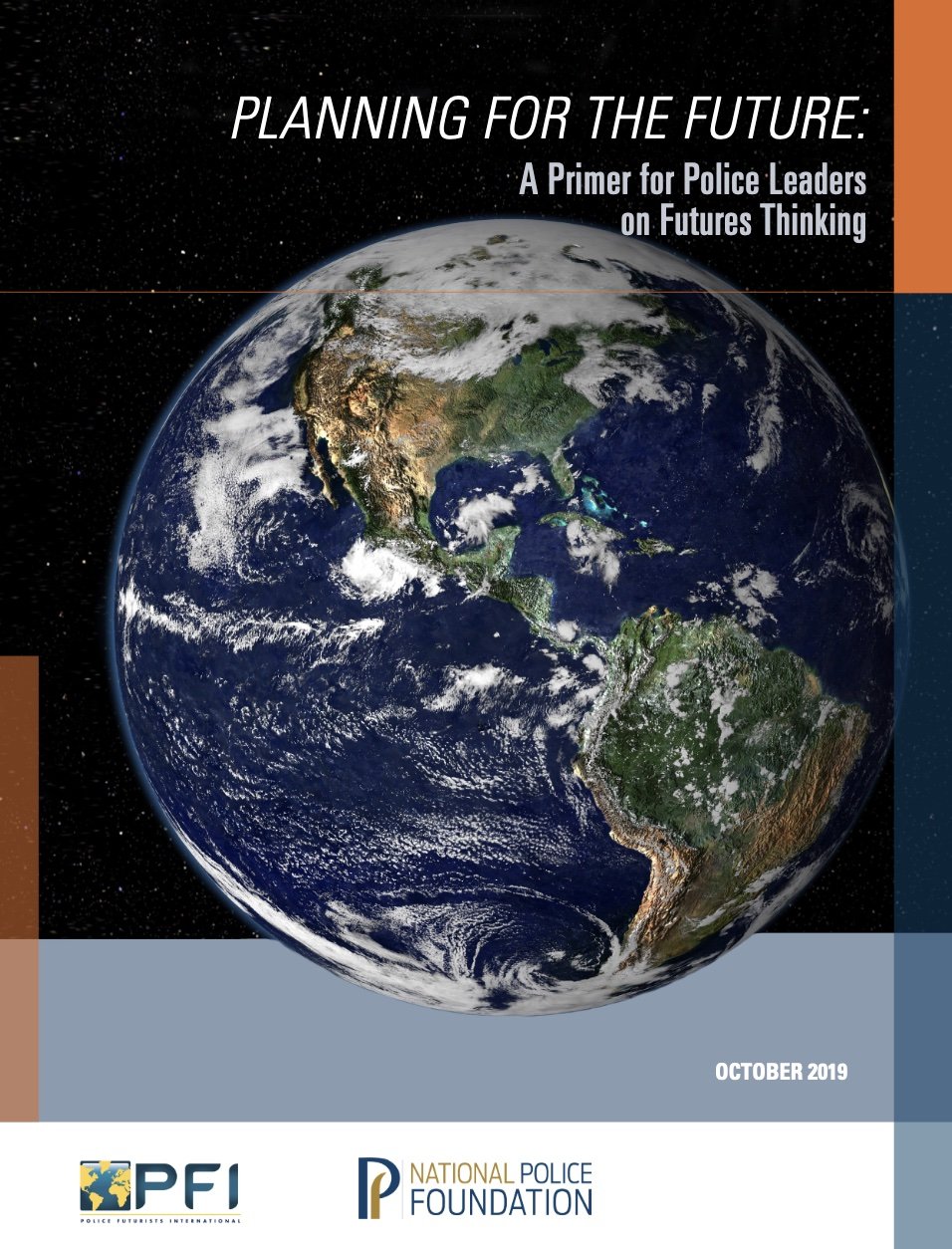
Planning for the Future: A primer for Police Leaders on Futures Thinking
A joint effort by the National Policing Institute and the Society of Police Futurists International to help leaders think about the future.
-

Vision of Law Enforcement Technology in the Period 2024-2034
This document captures the discussions of a USDOJ NIJ-funded workshop to explore future visions of law enforcement and identify and prioritize needs in technology, policy, and practice based on those visions.
Future Policing Tools
-

State of Legitimacy Matrix
This tool helps conceptualize an external view of a policing organization’s state of legitimacy in the eyes of the public.
-

Readiness for Change Matrix
This tool helps understand a police agency’s readiness for change. It builds on the work around “readiness levels” as used in situational leadership strategies.
-

Legitimacy Action Matrix
This tool combines the concepts of a police agency’s “legitimacy state” and “readiness level” for change to inform the proper strategy for moving the organization toward a high state of police legitimacy.
-

Innovation Exchange Memo and Form
This memo explains the Innovation Exchange concept. It, and its accompanying Post-Visit Form, are in Word format so readers can modify it for their organizations.
Policing & Artificial Intelligence
Documents and Tools
-

Model AI Policy
Included here is the Model AI Policy in Word format.
-

Sample Department Policy Memo
Included here is a sample department memo regarding the AI policy in Word format.
-

About the Model Policy on Generative AI
This is an explanatory document regarding the policy as a risk reduction approach to introducing generative AI tools to a police agency.
-

4 Principles for Policing's use of Artificial Intelligence
This document helps police agencies explain to the communities they serve how they view their responsible use of AI.
-

AI Guiding Principles Infographic
Infographics can be used to enhance the public’s understanding of complex policing issues. This infographic helps police agencies explain the principles they use to guide their responsible use of A to the communities they serve.
-

AI Implementation Checklist
This document provides broad guidelines for considering the implementation of AI technology or evaluating technology already used in the organiation.
-

Covenant for Using AI in Policing (UK National Police Chiefs' Council)
This document was adopted by the UK’s National Police Chiefs’ Council (NPPC) in September 2023. It covers a set of principles and guidelines for the use of AI in policing in the UK. It was produced in coordination with Britain’s The Office of the Police Chief Scientific Adviser (OPCSA). Go to https://science.police.uk/ to learn more.
-

Deepfake Infographic
Deepfakes are becoming more prevalent and more realistic. The problem is worsening. Public trust and confidence in the police can be shaken when deeepfakes show officers doing or saying things they never did or said. This infographic helps market the idea that people should check the facts, evaluate what they see or hear or call the police department and ask if what they saw or heard is true – before they believe it.
-

AI FAQ's: How we will use AI
Coming soon: Template for AI FAQ’s about how the police will use AI
-
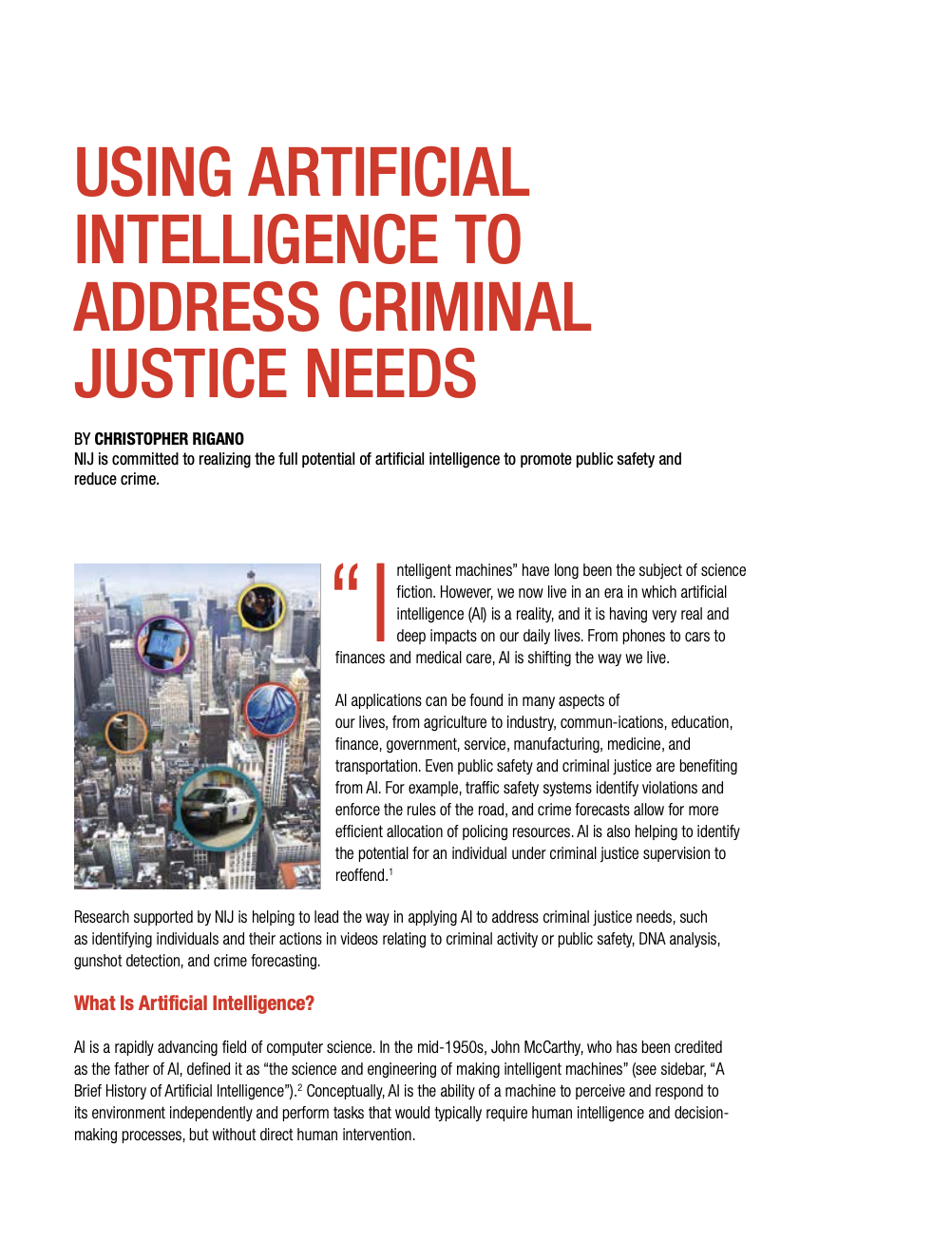
Using Artificial Intelligence to Address Criminal Justice Needs
Artificial intelligence has the potential to be a permanent part of our criminal justice ecosystem, providing investigative assistance and allowing criminal justice professionals to better maintain public safety. This 2019 NIJ Journal article outlines views of AI and the criminal justice system.
-

INTERPOL AI Toolkit
The Toolkit for Responsible AI Innovation in Law Enforcement was developed by INTERPOL in June 2023, together with the United Nations Interregional Crime and Justice Research Institute (UNICRI), to provide guidance on the responsible use of AI by law enforcement agencies. It is intended to help law enforcement agencies address the most pressing challenges in using AI.
-

City of Rahway, NJ AI Use to analyze claims against the City
This document presents a detailed AI-enabled analysis of open claims against the City of Rahway, NJ for 2023. It focuses on identifying patterns and trends within different types of incidents, the frequency of individuals involved in claims, and department-specific injury trends.
Future Policing Briefs
-
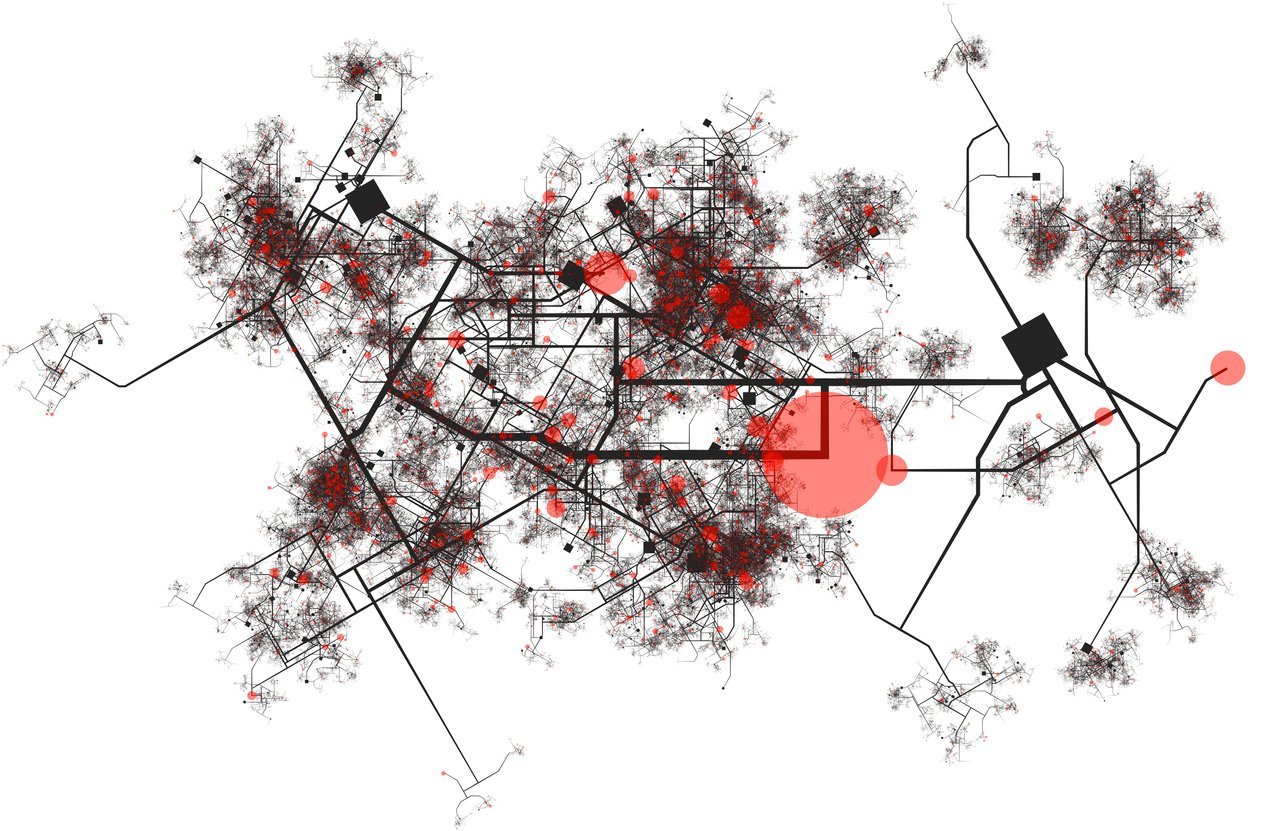
Evidence Based Policing
This brief decscribes the value of evidence based policing to police organizations and the communitiies they serve.
-

GMRS Radios: Officer & Community Preparedness
This brief summarizes how GMRS radios provide potentially life-saving value to police organizations, officers and community members
Future Policing & COP-AI Newsletters
-

Future Policing
April-June 2024
-

Future Policing
January-March 2024
-

cop-ai newsletter
March-April 2024
-

FPI Futurecast 2024
FPI’s predictions for 2024
Future Studies and Future Policing Issues
Advancing Policing
-
US DOJ Office of Community Oriented Policing
The Office of Community Oriented Policing Services (COPS Office) is the component of the U.S. Department of Justice responsible for advancing the practice of community policing by the nation's state, local, territorial, and tribal law enforcement agencies through information and grant resources.
-
US DOJ Bureau of Justice Assistance
The Bureau of Justice Assistance (BJA) was created in 1984 to reduce violent crime, create safer communities, and reform our Nation’s criminal justice system.
-
National Policing Institute
The National Policing Institute, formerly known as the National Police Foundation, is dedicated to advancing the impact and delivery of police services through change and reform. The Institute provides services in three main areas: research and evaluation, training and technical assistance, and organizational assessments and after-action reviews (AARs).
-
International Association of Chiefs of Police (IACP)
The International Association of Chiefs of Police (IACP), as the world’s largest and most influential professional association for police leaders, is committed to advancing the safety of communities worldwide.
-
Police Executive Research Forum (PERF)
Founded in 1976 as a nonprofit organization, the Police Executive Research Forum (PERF) is a police research and policy organization and a provider of management services, technical assistance, and executive-level education to support law enforcement agencies.
-
National Association of Women Law Enforcement Executives
The general purpose and mission of the National Association of Women Law Enforcement Executives, Inc. shall be to promote the ideals and principles of women executives in law enforcement; to conduct training seminars to train, and educate women executives in law enforcement; including but not limited to the areas of leadership, management, and administration; to provide a forum for the exchange of information concerning law enforcement, and generally fostering effective law enforcement.
-
National Organization of Black Law Enforcement Executives
NOBLE is at the forefront of providing solutions to law enforcement issues and concerns, as well as to the everchanging needs of our communities. Our commitment to “Justice By Action” serves the demands of law enforcement issues worldwide which makes NOBLE a valuable asset for anyone interested in pursuing the improvement within the administration of justice.
-
Final Report of the President’s Task Force on 21 st Century Policing
This is the Final Report of The President's Task Force on 21st Century Policing, whose mandate was "to identify best policing practices and offer recommendations on how those practices can promote effective crime reduction while building public trust.”
-
21st Century Policing Task Force Report: The First Five Years
This report was prepared by the National Police Foundation (NPF). The National Police Foundation is the oldest nationally known, non-profit, non-partisan, and non-membership driven organization dedicated to advancing policing through innovation and science.
-
21st Century Policing Blueprint
The IACP defines 21st Century Policing strategies as best practices designed to help agencies promote effective crime reduction while building public trust and safeguarding officer well-being.
-
Policing in the 21st Century
This guide is designed for local elected leaders offering guidance on how law enforcement officials can implement the principles of community policing. More specifically, it provides an overview of the recommendations from the President’s Task Force on 21st Century Policing.
Evidence Based Policing
